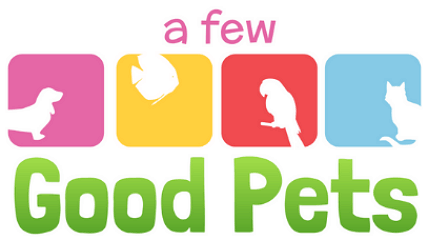Aside from the pellets and hay that make up the bulk of their herbivorous diet, guinea pigs can eat various fruits and vegetables that match their nutritional needs.
If you suddenly ran out of pellet food for your guinea pigs, what are alternatives that you can easily find in your pantry?
In this article, we will talk about the healthy alternatives that you can safely give to your guinea pig and easily find at your home while waiting for your next delivery of pellets and hay.
After reading this article, your pet will never go hungry again.

Table of Contents
12 Foods Guinea Pigs Can Eat When You Run Out of Food
1. Apples
Apples make a safe and yummy treat for your guinea pigs. So long as they are fed in moderation, there won’t be any problem with them eating this fruit.
However, because apples contain more sugar than hay and grass, they can easily consume an excessive amount of calories from eating them, which can lead to gaining weight. Therefore, apples should not be part of guinea pig’s daily diet, and should only be considered as an occasional snack.
If you happen to have apple trees in your yard, you can even give them the leaves which contain beneficial calcium. You may also put in some small branches for them to play with and use to trim their teeth.
It is important to note that there are types of apples that are not suitable for guinea pig consumption, particularly unripe or sour apples. This is because they contain acids that can irritate the guinea pig’s mouth. They should also not eat rotten apples.
2. Bananas
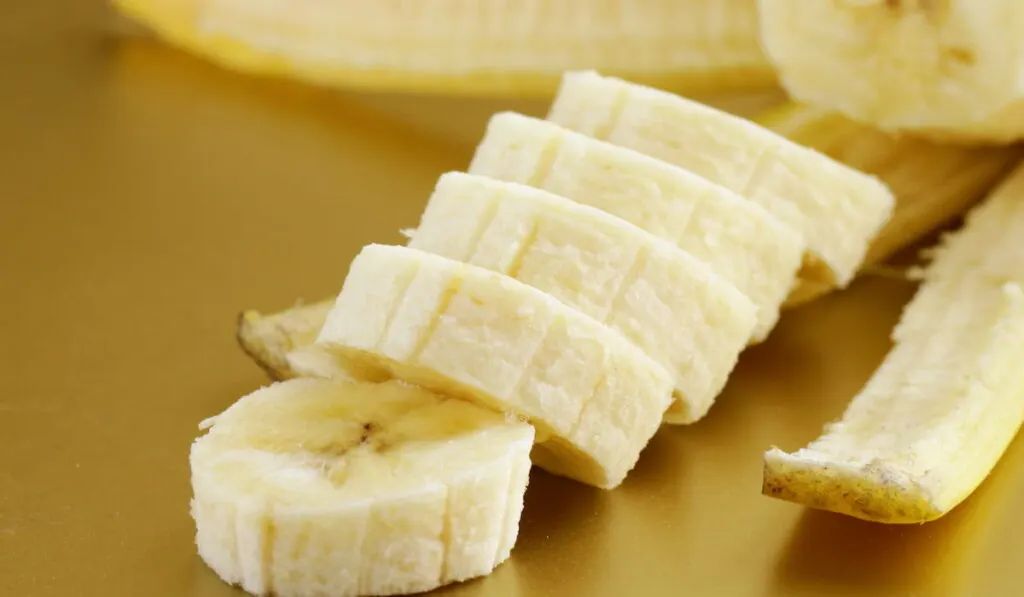
Bananas also make a great alternative food for your guinea pigs. However, like apples, they should also be given in moderation. This is because although bananas have vitamin C, which is essential in a guinea pig’s diet, they also contain high amounts of sugar.
Ensure to only feed fresh, ripe bananas to your pet. Giving them processed bananas, such as dried bananas and banana chips, will allow them to consume additional amounts of sugar.
So long as fed in small quantities, bananas make an excellent treat.
3. Bell Peppers
All colors of bell peppers will provide the necessary nutrients for your guinea pig. However, yellow, orange or red bell peppers are preferred as they contain higher amounts of vitamin C.
You can feed your guinea pig about 1 to 2 tablespoons of bell pepper in a day.
4. Broccoli
Every part of broccoli is beneficial and can be eaten by guinea pigs. Broccoli is low in sugar but is high in antioxidants, fiber, vitamins, and minerals which makes it a great addition to or alternate food in your guinea pig’s diet.
5. Carrots
Sweet and nutritious, carrots are an excellent food for your pet so long as given in moderation. High in vitamin C and fiber, carrots, including the green tops, can be fed to guinea pigs.
6. Cauliflower
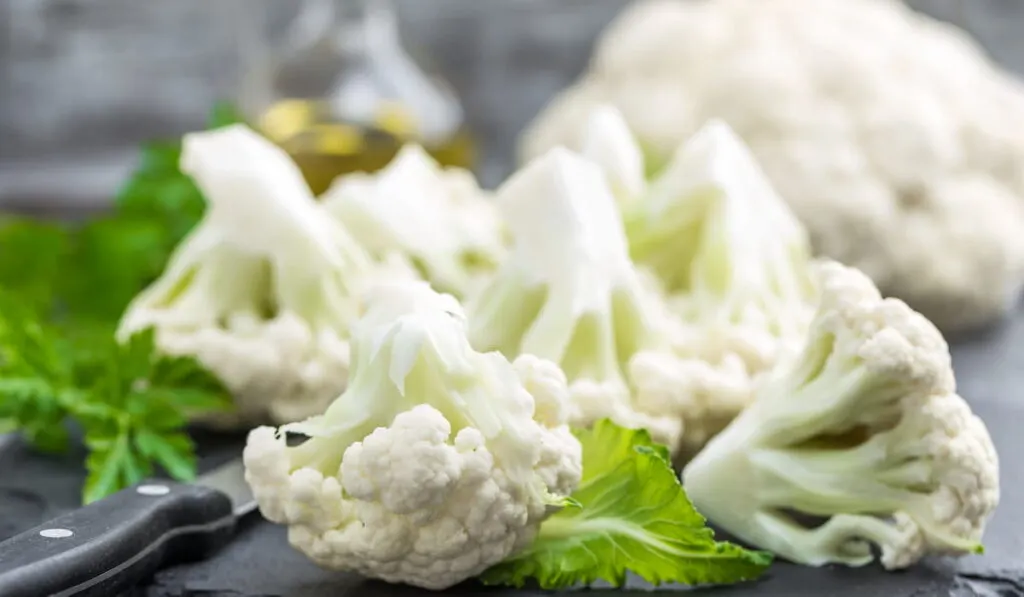
Budget-friendly, low in calories, and high in vitamin C and fiber, cauliflower makes a great healthy alternative to pellets and hay. While guinea pigs will enjoy the cauliflower itself, they will be happier to eat the leaves.
However, keep in mind to feed them cauliflower sparingly. Giving them too much of it can cause gas that can upset your pet’s stomach.
7. Kale
A popular superfood, kale is great for your guinea pig’s digestive health. It is also packed with vitamin C which complements your pet’s nutritional needs.
8. Lettuce
Lettuce makes one of the best alternatives for your guinea pig’s diet. As a matter of fact, leafy greens should take up the second-largest portion of the guinea pig’s diet, next to timothy hay.
Although any type of lettuce can be fed to guinea pigs, Romaine lettuce makes the best option to feed on your pet. Not only is it easy to find, but it also contains higher amounts of vitamin C and fiber.
9. Fresh grass from an untreated lawn
Grass is abundant and can easily be found in your own outdoor space or perhaps in your neighbor’s yard. Like timothy hay, fresh grass is rich in fiber, which makes it an excellent source of nutrients for your guinea pig.
Before giving the grass, make sure to trim and clean it so as not to feed dirt to your guinea pig.
It is just as important to ensure that the grass comes from an untreated lawn. This is because treated grass may contain hazardous chemicals which can put your guinea pig’s health at risk.
Additionally, make sure that the lawn you’re getting grass from is not occupied by other animals since their urine and feces can transmit parasites and diseases to your guinea pig.
10. Oranges
Because of their high vitamin C content, oranges are a great choice for your guinea pigs. However, like all other fruits and vegetables, they should only be given occasionally since high amounts of sugar can cause diabetes and obesity for these animals.
11. Plums
Again, so long as given in moderation, plums make great snacks for your guinea pigs.
However, the most important thing that you need to keep in mind before feeding them plums is to take out the pit.
This is because the plum’s pit contains cyanide which can be dangerous to your pet if consumed. While consuming the whole pit can cause a choking hazard to dogs and humans, it is even more of a risk to guinea pigs. So make sure that they don’t gnaw on or eat it.
On the positive side, fresh plums contain vitamins A, C, E, and K which are all beneficial to guinea pigs. They are also rich in potassium, antioxidants, and flavonoids.
Never feed your guinea pig dried plums, or prunes, as they contain a very high amount of sugar which can cause an upset stomach.
12. Squash
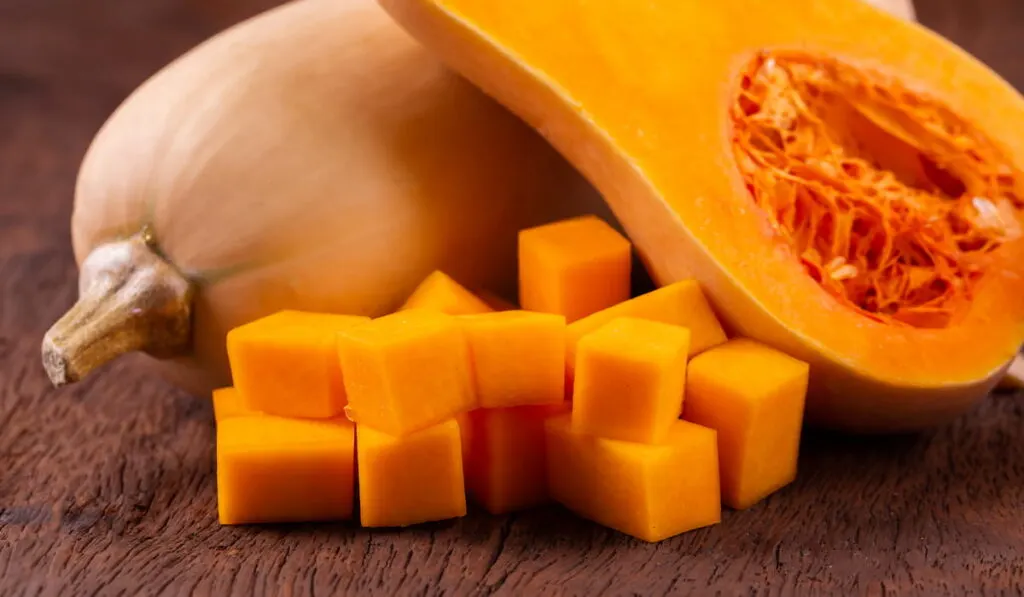
All squash varieties can make excellent alternatives for your guinea pig’s diet so long as given occasionally. Some of the most popular and easy-to-find squash varieties that you can feed to your pet are zucchini and butternut squash.
Although they are high in sugar, they also contain beneficial nutrients.
What Not to Feed Your Guinea Pig
While there are a lot of foods that guinea pigs can safely eat, of course, there are also foods that they should not eat.
Here are some of the foods that your guinea pig should never eat:
1. Dairy foods
Guinea pigs should follow the plant-based diet strictly because they do not have the enzymes to digest other foods, including dairy products such as butter and cheese.
2. Meat
Remember, guinea pigs are herbivores which means that they should never eat meat under any circumstances.
3. Nuts and seeds
Not only can they cause choking hazards, but nuts and seeds can also be toxic to guinea pigs.
4. Potatoes
Potatoes contain alkaloids that are toxic to guinea pigs, and therefore should not be fed in any situations.
5. Excessive amount of fruits
As mentioned earlier, although there are certain fruits that are safe for guinea pigs to eat, eating too much of them can cause several health concerns. Therefore, make sure to feed your guinea pigs fruit moderately.
6. Other commercial pet food that are not designed for guinea pigs
You might think that feeding your guinea pig other pet’s food would be okay. However, that is the opposite of what you should do.
Foods designed for other pets should not be eaten by guinea pigs as they may contain substances that these animals cannot fully digest.
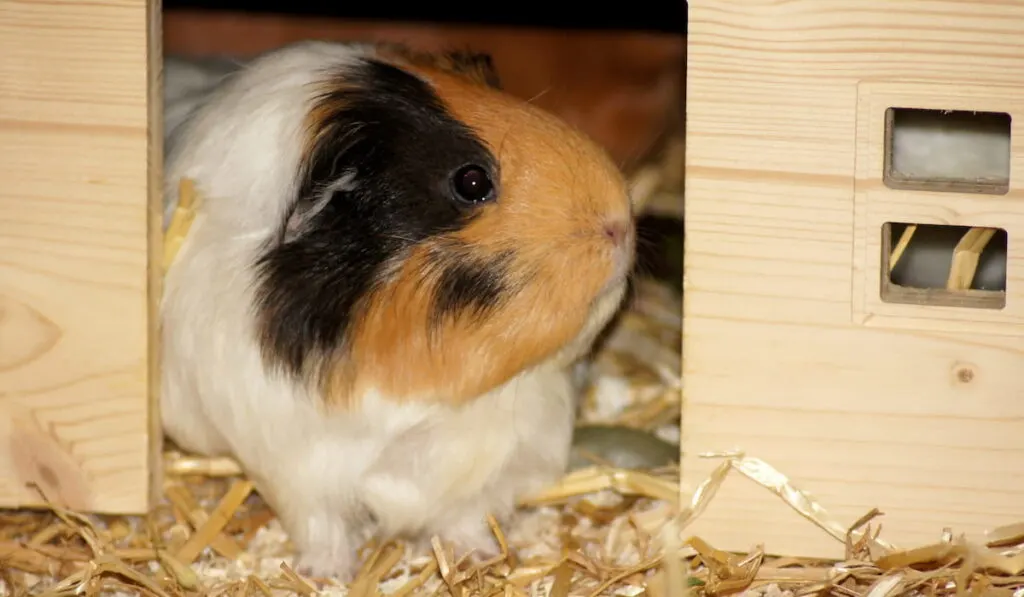
How Long Can Guinea Pigs Go Without Hay?
Ideally, guinea pigs should never be left without any fresh hay for one to two days at most. However, unexpected occurrences do happen.
During this time, you may feed your guinea pigs the healthy alternatives mentioned above, but make sure to buy them hay the next day.
If your guinea pig is not able to eat hay for several days or weeks, this can negatively affect their health. Hay does not only provide them with nutrients, but it also helps trim their constantly growing teeth.
In addition, hay also contains abundant fiber which is beneficial for your guinea pig’s digestive health.
Knowing Your Guinea Pig’s Dietary Needs
Like humans, guinea pigs cannot produce vitamin C on their own. Because of this, they are prone to vitamin C deficiency, commonly called scurvy. Every day, guinea pigs need about 30 to 50 mg of vitamin C.
Fortunately, fruits and vegetables that are safe for guinea pig consumption contain nutrients and minerals that they need. Even if you run out of pellets, hay, or treats for your guinea pigs, you can use the foods mentioned above to feed your pets.
Keep in mind that fruits and vegetables should not be part of your guinea pig’s daily diet. Instead, they should only be given occasionally, such as when you ran out of hay, for instance, or as treats.
If you notice that your guinea pig is acting differently after eating, take them to the veterinarian immediately.
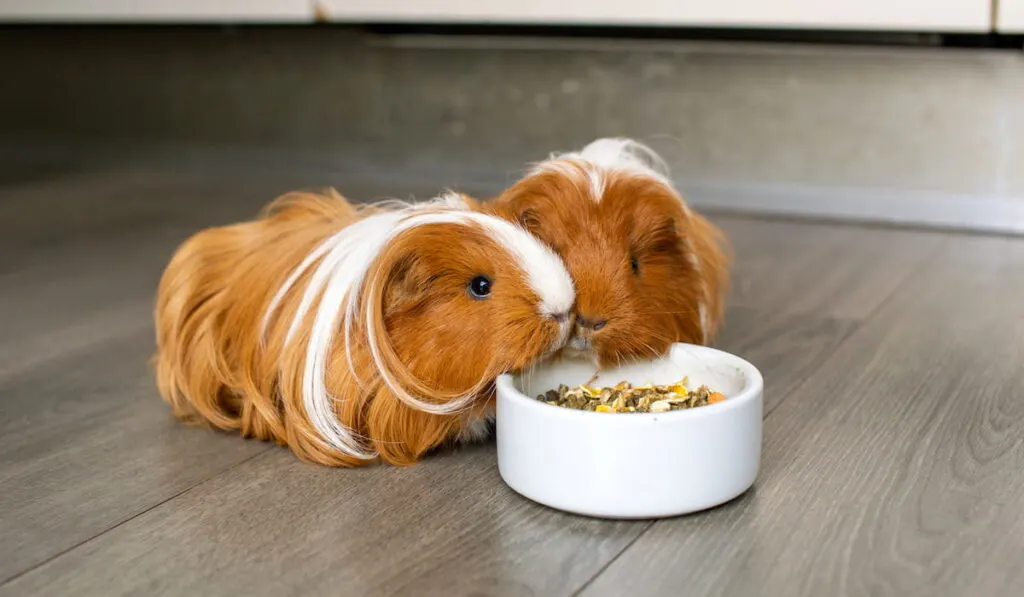
Conclusion
You don’t have to panic if you run out of hay or pellet food for your guinea pig. Instead, give them some of these healthy alternatives for a day or two, and then buy them hay as soon as possible.
However, it is still best if you keep your supply stocked to avoid running out of hay.
When it comes to alternative foods, make sure to give them in moderation to avoid health issues. It is just as important to thoroughly wash the food to remove harmful chemicals, as well as cut them up into small pieces before giving them to your guinea pig to avoid the risk of choking.
References:
- https://cleverpetowners.com/what-to-feed-guinea-pigs-when-out-of-food/
- https://petkeen.com/what-to-feed-your-guinea-pig-when-out-of-food/
- https://www.petco.com/content/petco/PetcoStore/en_US/pet-services/resource-center/food-nutrition/guinea-pig-care-diet-and-feeding-tips.html
- https://squeaksandnibbles.com/can-guinea-pigs-eat-apples/
- https://squeaksandnibbles.com/can-guinea-pigs-eat-plums/
- https://squeaksandnibbles.com/can-guinea-pigs-eat-bananas/
